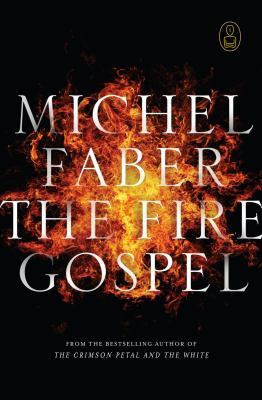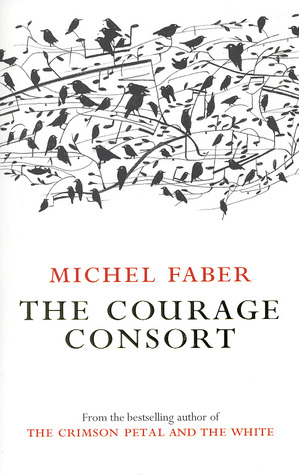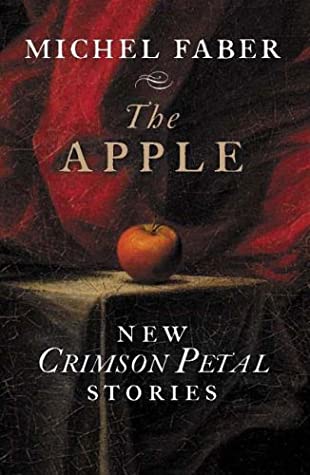As I’ve mentioned before on this blog, I have a hit or miss relationship with the Canongate Myths series. The contributions of Jeanette Winterson and Margaret Atwood failed to excite me and, expecting no less from Ali Smith (see Girl Meets Boy), found myself suitably impressed. Now Michel Faber has entered the arena to present his reworking of the Prometheus myth, of how he stole fire from Zeus and gifted it to humanity, subsequently being punished for his crime.
Unlike the other writers in the Myths series so far, Faber is one I do enjoy reading: his style is always light, his subject matter nothing if not protean. One only has to read his story collections to get a feel for the variety he’s capable of. Introduced via his The Crimsol Petal And The White, a huge, postmodern Victorian tale concerning the rise of a prostitute to civilised society, I was quick to seek out his other works – another novel, two novellas, and three short story collections. Add to that The Fire Gospel (2008).
Faber’s Prometheus is Theo Griepenkerl, a Canadian academic with a heightened sense of himself. He’s in Iraq, courtesy of the museum he works for, to tour a looted musem with the intention shipping artefacts home. The tour doesn’t last long as a bomb goes off killing the curator and, by chance, spilling forth some papyrus scrolls hidden for almost two thousand years. His talent being Aramaic, Theo recognises the potential power of the scrolls and smuggles them out of the country:
He could barely wait. Those papyri were burning a hole in his briefcase. They were like a stash of pornography that he’d been forced to delay getting to grips with. Not that there was anything kinky in his attraction to the scrolls; the porn comparison was just…a metaphor. A metaphor for the promises the papyri were urgently whispering from the back seat, of what they were going to do for him.
The scrolls are written by Malchus, the high priest named in the Gospel of John, and deviate from the accepted story of the Gospels.What makes them historically significant is that they are an eye witness account of the Crucifixion, predating the other Gospels by at least thirty years. What else can Theo do but publish them? In doing so, in his role as Prometheus, he brings fire to the world.
The tone of The Fire Gospels is satire. To a publishing industry that has seen Dan Brown’s odious The Da Vinci Code and Richard Dawkins’ confrontational The God Delusion upset the apple cart of Christianity, generating huge profits as they go, it remains to be seen what the reaction to physical evidence dispelling the Christian faith would be. Faber imagines the likely scenario, that of outrage, and has great fun with the worldwide reactions to such material, nowhere more so than a pitch-perfect chapter of Amazon reviews, complete with the spelling mistakes, irrelevant opinion, or ignorance that someone always seems to find helpful.
I did not buy this book, so this author will not make a dime off me. I read it over a two day period in my local bookstore. The so-called gospel of Malchus is a blatant forgery produced by Muslims to undermine our faith. It’s been tried before. When will they learn?
Beyond the religious aspect Faber takes time out to send up the book industry, in areas such as remuneration, book tours, and marketing. Then, beyond that, the very decline in culture itself, be it in the vacuous array of choice television offers or in noting that the advances for those contributing to culture is low while sportsmen are signing $10m deals.
In continuing with the Prometheus myth Faber has to continue the parallel. The punishment meted out by Zeus was being chained to a rock and have an eagle peck out and consume his liver, once it had grown back, daily. With Theo interested only in money and sex, and never straying into likeable or unlikable territory, it’s hard to care for his predicament when his punishment comes. It’s a low point in the book, especially at such a crucial point in the story, but given the satirical tone Faber just about gets away with it.
Like other Faber works, The Fire Gospels remains an open ended affair leaving the reader to draw their own conclusions. It’s good at what it does, spoofing the publishing hysteria over religious books in recent years, but all the time there’s the nagging sensation that Faber can do better. However, as Theo notes, it’s a case of different strokes for different folks:
If there was one thing the Pandora’s box of Amazon customers had taught him, it was that there was no fiction so outrageously, laughably, arrogantly false that somebody somewhere wasn’t moved to tears by it.



I agree with you that the Canongate myths are a hit and miss affair, although we disagree about the specific titles.
This sounds like one to look forward to – I didn’t know the next ones were on their way. I read my first Faber this summer ‘Under the Skin’ – and it caught me unawares, bloody strange but utterly compelling with it.
Oh, I’m not saying it’s a bad book, Jem. I liked it, even if it petered out a bit toward the end – as all fires must do, I suppose. I think that Faber’s The Crimson Petal And The White may be a bit of an albatross to him now, though: everyone knows he is capable of such brilliance, but it seems like it may just be that one truly good book that everything else they write gets, fairly or unfairly, compared to.
Stewart – The Crimson Petal and the White is one of my all time greats – an excellent book in every way, and one of the few that several years after reading it, I can still recall reasonably well. I will seek this one out, but probably from the library (the spending has to stop!). However, the Hermann Ungar book you mentioned on my blog is a must have and is on its way to me. Thanks for dropping by